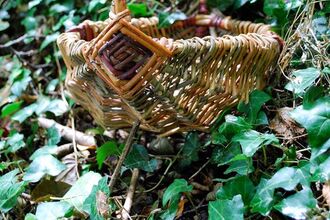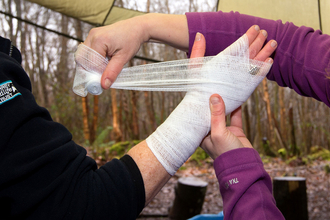If you would like to ease into the New Year looking forward to a few new goals, take a look at what is being offered in the Adult learning programme.
My name is Sue O’Regan, and I run the Adult learning programme for Surrey Wildlife Trust. I tell everyone who asks me what I do, that I have the best job in the world. I come up with various wildlife related courses, find suitable tutors and venues before promoting them to both our members and those who may not know about the Trust.
Read on for everything you need to know about our adult learning courses…
1. What kind of skills can I explore with Surrey Wildlife Courses?
We literally offer courses for everyone! There are sessions where nature lovers can discover how to identify local species and conduct their own surveys. Practical conservation activities such as coppicing and scything are popular with those who like to get their hands dirty. For the creative types there are classes where locally sourced products are turned into beautiful pieces of art. While those seeking relaxation can discover the calming effects of nature through Forest Bathing and yoga.
2. Are any of the skills I learn from the courses transferable to other life experiences?
After meeting so many of our delegates I have grown to understand how all our courses have impacted on their lives. Whether offering a well-deserved break from the day-to-day routine to opening the door to a new career, every attendee leaves refreshed and inspired.
3. I want a career in wildlife conservation, will some of these courses help?
We often see those who are contemplating a career change on our GIS for Beginners course and The Tree Safety and Inspection course which offers a LANTRA certification. The two day outdoor First Aid course is a prerequisite for many jobs ranging from child care practitioners to rangers.
4. Are the courses online or in person?
One of the most important aspects of organising a course is to ensure that we book the right tutor. They must provide that special mixture of subject expertise, confident delivery and engaging enthusiasm. We are lucky that some of these people are current Surrey Wildlife Trust employees while others are located through various external sources.
Most of our courses are in-person events and offer a mixture of classroom training and outdoor activities. This way a delegate can learn in a traditional manner while actively participating directly with nature.
5. How do the courses make people feel closer to nature?
Offering wildlife courses can be historically difficult as nature does not always play by the rules. So, when we run the Reptiles of Surrey or Dormouse sessions, for example, there can be a risk that we will not see the species being studied. But, that can also be the beauty of joining a course. We recently ran the popular Bat Ecology session and only detected a few bats on our walk. But while enjoying the woods at dusk we spotted great crested newts in the pond, heard the tawny owl cry, spotted badger activity and interrupted three foraging deer. Not one attendee was disappointed!
Our goal is that after every course, a delegate sees nature in a new and different way.
6. Do I need any prior experience to attend the courses?
As all of these programmes are targeted at those who are beginners and in some cases improvers, every course is open to all. That way, if someone is curious about a topic, they can use one of these classes to find out more.







